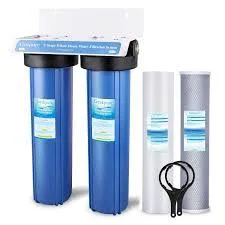Carbon block filter cartridge
A carbon block filter is a highly effective type of activated carbon filter used to remove chlorine, chemicals, taste, odor, and some contaminants from water. It’s denser and more efficient than granular carbon (GAC) filters.

Key Features:
Material: High-quality activated carbon (often coconut shell-based)
Micron Ratings: Typically 0.5 – 10 microns
0.5–1 micron: Removes finer particles and some cysts (like Giardia, Cryptosporidium)
5–10 micron: More general use (better flow rate)
Removes: Chlorine, taste, odor, VOCs, THMs, and some heavy metals
Used In: Under-sink systems, RO systems, countertop filters, whole-house systems
Low pressure drop: Maintains efficient flow due to uniform pore distribution
Flow Rate: Slower than GAC filters but more effective
Filtration Type: Adsorption + mechanical filtration
Better Than GAC: Tighter structure = less channeling, better contaminant removal
Benefits
Excellent chlorine and taste/odor removal
Longer contact time = better filtration
Less risk of “channeling” compared to GAC filters
Can filter out sediment and some microorganisms
Often NSF-certified for safety and performance
Summary
Filtration Type: Depth filtration via melt-blown PP fibers.
Efficiency: Excellent—captures very fine particles (down to 0.1–1 µm).
Dirt Capacity: High, thanks to gradient layering.
Durability & Safety: Robust chemical resistance; no binders; FDA-compliant.
Performance: Efficient flow (low pressure drop); suitable across varied industries.
Variations: Available in flat, grooved, embossed forms to optimize performance.
Ideal For: Pre-filtration in water systems, industrial filtration, and sensitive applications.